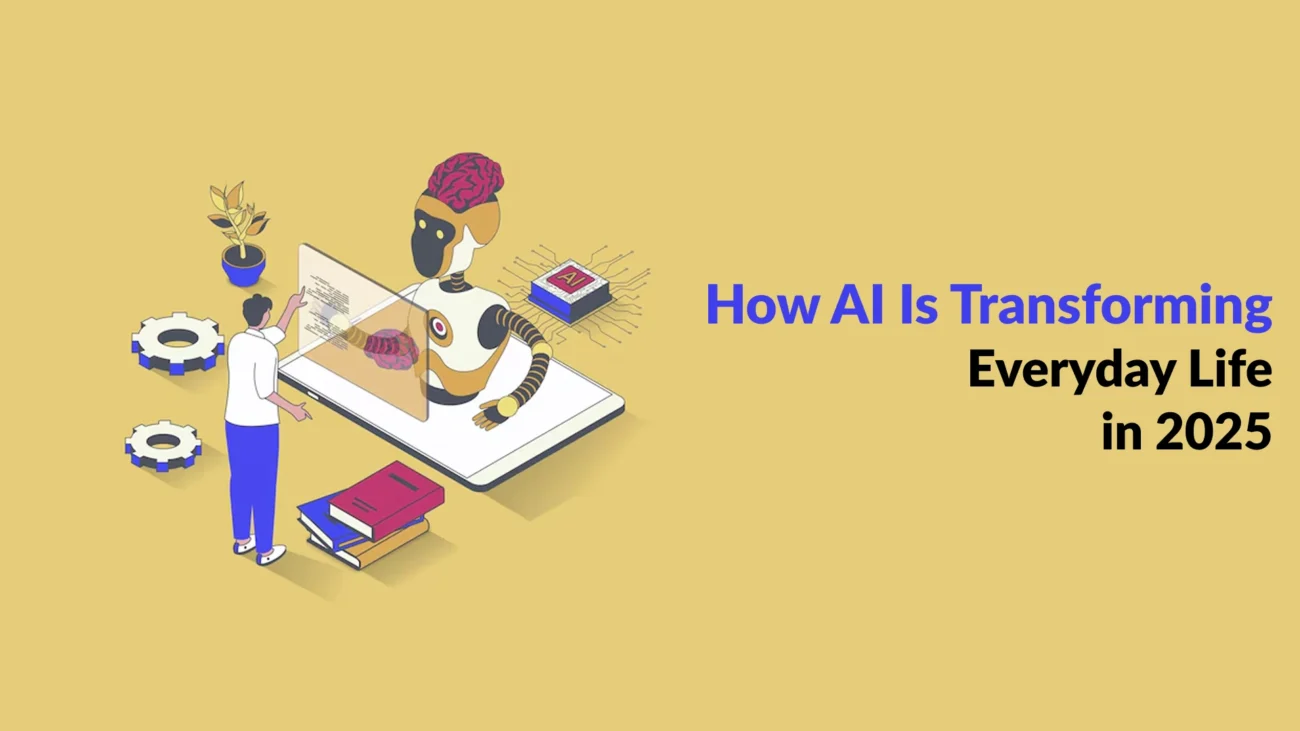Artificial Intelligence 2025 is no longer a concept of the future—it’s now an integral part of modern life. From smart home AI Is Transforming Everyday Life in 2025 innovations to AI-powered devices and apps we use daily, the presence of AI in everyday life is undeniable. Whether you’re checking the weather, adjusting room temperature, or scheduling meetings with a virtual assistant, AI and automation in daily tasks are simplifying and enhancing how we live.
This article will explore how AI is transforming everyday life in 2025, with a special focus on key sectors like productivity, healthcare, education, and the home. It also dives into the impact of AI on daily life, providing real-world examples that matter most to consumers, professionals, and students alike.
1. The Rise of Smart Home AI 2025
One of the most noticeable areas where AI in everyday life is flourishing is within our homes. Smart home AI 2025 has brought a wave of connected appliances and devices that anticipate our needs.
From AI-enabled thermostats adjusting room temperatures based on your behavior to voice-activated assistants that control lighting, security systems, and even grocery lists, the home has become an intelligent partner in daily comfort.
Smart home examples include:
- AI fridges that suggest recipes based on what’s inside.
- AI-powered security systems with facial recognition.
- Personalized lighting and temperature settings.
These changes show how AI integration in modern life is transforming the concept of home into a hub of convenience and intelligence.
2. AI-Powered Devices Enhancing Productivity
In 2025, AI tools for productivity are redefining how we work, learn, and organize our lives. From smart scheduling apps that automatically adjust to priority shifts to virtual assistants managing emails, AI-powered devices are working 24/7 to save us time and reduce mental load.
Some notable AI productivity tools include:
- AI meeting summarizers and transcription software.
- Intelligent task management apps that learn from user habits.
- Smart calendar assistants that recommend optimal schedules.
These advancements are not only convenient but also essential for professionals, students, and creatives juggling multiple tasks daily.
3. AI in Education and Healthcare: Transforming Critical Sectors
Education
AI in education and healthcare is opening doors to personalized experiences and efficient systems. In education, AI-driven platforms can analyze student performance and suggest tailored learning paths. This adaptive learning model ensures that students progress based on their individual strengths and weaknesses.
Key uses in education:
- AI tutors providing 24/7 learning support.
- Smart grading systems reducing teachers’ workload.
- Personalized curriculum planning using predictive analytics.
Healthcare
In healthcare, AI technology 2025 is a game-changer. From early diagnosis using imaging AI to chatbot triage systems that direct patients to appropriate care, the future of artificial intelligence is already here in clinics and hospitals.
Notable benefits include:
- Faster, more accurate diagnoses.
- Remote monitoring via wearable AI health devices.
- AI-powered robotic surgeries with enhanced precision.
4. AI and Automation in Daily Tasks
From grocery shopping to driving, AI and automation in daily tasks are everywhere in 2025. Autonomous delivery drones, self-driving vehicles, and robotic process automation (RPA) in administrative work all serve to reduce time and effort for users.
Examples of automation through AI:
- Grocery apps predicting shopping needs and auto-ordering essentials.
- AI in cars improving traffic safety through real-time data analysis.
- Voice AI assistants handling calls and appointments.
These real-world examples demonstrate the practical impact of AI on daily life, providing not just convenience but also improved safety and efficiency.
5. AI Integration in Modern Life: A Seamless Experience
Today’s consumers don’t just want AI—they expect it. Whether it’s AI suggesting the next binge-worthy show or curating a playlist to match your mood, AI integration in modern life offers seamless personalization.
In 2025, AI is silently working in the background to enhance user experiences in:
- Entertainment (personalized recommendations).
- Finance (AI budgeting tools and fraud detection).
- Travel (AI-driven itinerary planners and translators).
This invisible integration shows how AI is changing daily life without demanding extra effort from users.
6. The Future of Artificial Intelligence: Ethical and Responsible Growth
As AI becomes more integrated into our lives, ethical considerations grow. Concerns around privacy, bias, and accountability are critical in shaping the future of artificial intelligence. In 2025, responsible AI development is a top priority for tech companies, governments, and institutions.
Ethical focus areas:
- Transparent algorithms and decision-making processes.
- Data privacy and secure AI applications.
- Fairness in AI systems to avoid discrimination.
These factors are vital for maintaining trust and ensuring that AI in everyday life continues to benefit everyone.
7. Who’s Using AI in 2025?
Primary users:
- Millennials and Gen Z are the biggest adopters, using AI in apps, smart home devices, and wearable tech.
- Tech-savvy readers and early adopters enjoy experimenting with AI for personal and professional gains.
Secondary users:
- Entrepreneurs leverage AI for market insights, automation, and customer service.
- Digital marketers use AI to predict consumer behavior and tailor campaigns.
- Educators and students rely on AI for research, grading, and personalized learning.
The wide adoption across various demographics shows how AI is transforming everyday life in 2025 from niche to necessity.
Conclusion
In 2025, AI is no longer just a buzzword—it’s a foundational element of how we live, work, learn, and connect. From smart home AI 2025 to AI in education and healthcare, the impact of AI on daily life is more profound and beneficial than ever.
As AI tools become more accessible and intuitive, consumers and professionals alike will find even more value in this transformative technology. By understanding and embracing this shift, we can harness the true power of AI technology 2025 to lead smarter, more efficient, and more connected lives.


